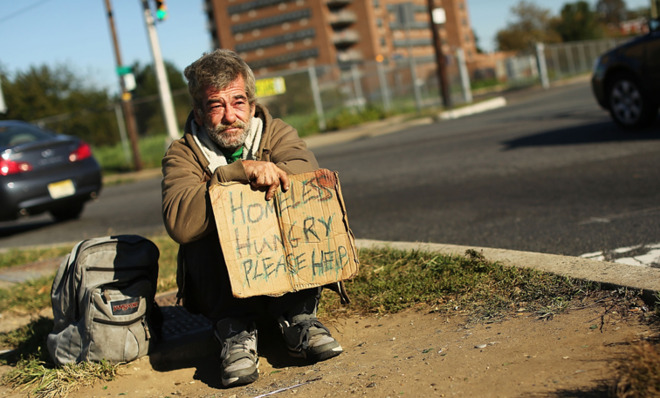The one fact that destroys Paul Ryan's anti-poverty plan
Even six years after the "recovery" started, there still aren't enough jobs


A free daily email with the biggest news stories of the day – and the best features from TheWeek.com
You are now subscribed
Your newsletter sign-up was successful
Last week Paul Ryan got another in a long line of inexplicable journalist tongue baths about how deeply concerned he is about poverty, this one practically indistinguishable from the last round. It even features the same reporter, McKay Coppins.
Now, I don't personally buy Paul Ryan's shtick for a moment. When you look at the content of his policy proposals, it overwhelmingly consists of slashing the bejesus out of programs on which millions of poor folks currently depend, and replacing them with bupkis.
But let's take him at his word for a moment. The theory that underlies Ryan's theory of poverty is that government benefits act, he says, like "a hammock that lulls able-bodied people to lives of dependency and complacency." This doesn't jibe with an understanding of the structure of poverty, but it does have a certain everyday, surface plausibility. Just speaking personally, I'm a pretty lazy person, and having some kind of structure forcing me to get my stuff done is enormously helpful in actually getting it done.
The Week
Escape your echo chamber. Get the facts behind the news, plus analysis from multiple perspectives.

Sign up for The Week's Free Newsletters
From our morning news briefing to a weekly Good News Newsletter, get the best of The Week delivered directly to your inbox.
From our morning news briefing to a weekly Good News Newsletter, get the best of The Week delivered directly to your inbox.
Here's the problem that Ryan-style poverty analysis has never even pretended to grapple with: If you're going to force people to do something, it must be actually possible to accomplish that thing.
Ryan's poverty plan is to starve the poor and unemployed out into the job market by taking away their benefits, so they can start earning money, participating in the economy, and earning self-respect and so forth. But what if there aren't enough jobs to go around? What if you're starving people out into a job market which, as a matter of arithmetic, simply can't accommodate them?
We can measure this and take it out of the realm of theory. It's pretty easy, in fact. What you do is count up the number of unemployed people and then count up the number of job openings, and then compare the two. Here's the data. At the height of the Great Recession, we find that there were almost seven job seekers per job opening; right now the number is 2.6. That only recently crossed to below the very worst it got during the last recession in the early 2000s when it peaked at 2.9. That's how depressions work, and we've understood that since Keynes laid out the logic of effective demand back in 1936 (and arguably before that).
Ryan and his fellow Republicans, of course, just refuse to acknowledge the obvious and readily available fact of jobs < job seekers, let alone the still fairly straightforward economics of depressions. And sympathetic reporters like Coppins never press him on it. Indeed, Ryan has gone further than advocacy already: As Ned Resnikoff points out, already 16 percent of Americans are going hungry on a regular basis. This is partly a result of eye-watering cuts to food stamps, which passed with Ryan's support. His own budget has much, much more severe cuts.
A free daily email with the biggest news stories of the day – and the best features from TheWeek.com
So regardless of how good Ryan is at emoting sympathy, without a realistic understanding of how things work he is simply a merciless poor-bludgeoning ideologue whose program consists of starving and taking money from the most vulnerable people in the nation. The Spanish inquisitors might have believed that they were simply saving people's eternal souls, but that didn't make the strappado any less painful or unnecessary.
Ryan Cooper is a national correspondent at TheWeek.com. His work has appeared in the Washington Monthly, The New Republic, and the Washington Post.
-
 Touring the vineyards of southern Bolivia
Touring the vineyards of southern BoliviaThe Week Recommends Strongly reminiscent of Andalusia, these vineyards cut deep into the country’s southwest
-
 American empire: a history of US imperial expansion
American empire: a history of US imperial expansionDonald Trump’s 21st century take on the Monroe Doctrine harks back to an earlier era of US interference in Latin America
-
 Elon Musk’s starry mega-merger
Elon Musk’s starry mega-mergerTalking Point SpaceX founder is promising investors a rocket trip to the future – and a sprawling conglomerate to boot
-
 The billionaires’ wealth tax: a catastrophe for California?
The billionaires’ wealth tax: a catastrophe for California?Talking Point Peter Thiel and Larry Page preparing to change state residency
-
 Bari Weiss’ ‘60 Minutes’ scandal is about more than one report
Bari Weiss’ ‘60 Minutes’ scandal is about more than one reportIN THE SPOTLIGHT By blocking an approved segment on a controversial prison holding US deportees in El Salvador, the editor-in-chief of CBS News has become the main story
-
 Has Zohran Mamdani shown the Democrats how to win again?
Has Zohran Mamdani shown the Democrats how to win again?Today’s Big Question New York City mayoral election touted as victory for left-wing populists but moderate centrist wins elsewhere present more complex path for Democratic Party
-
 Millions turn out for anti-Trump ‘No Kings’ rallies
Millions turn out for anti-Trump ‘No Kings’ ralliesSpeed Read An estimated 7 million people participated, 2 million more than at the first ‘No Kings’ protest in June
-
 Ghislaine Maxwell: angling for a Trump pardon
Ghislaine Maxwell: angling for a Trump pardonTalking Point Convicted sex trafficker's testimony could shed new light on president's links to Jeffrey Epstein
-
 The last words and final moments of 40 presidents
The last words and final moments of 40 presidentsThe Explainer Some are eloquent quotes worthy of the holders of the highest office in the nation, and others... aren't
-
 The JFK files: the truth at last?
The JFK files: the truth at last?In The Spotlight More than 64,000 previously classified documents relating the 1963 assassination of John F. Kennedy have been released by the Trump administration
-
 'Seriously, not literally': how should the world take Donald Trump?
'Seriously, not literally': how should the world take Donald Trump?Today's big question White House rhetoric and reality look likely to become increasingly blurred
